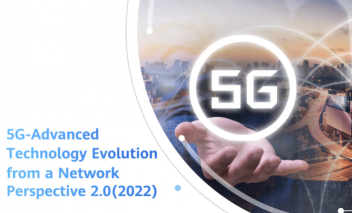During MWC22 Barcelona, Huawei released the joint white paper 5G-Advanced Technology Evolution from a Network Perspective 2.0 together with more than 20 industry partners, including China Mobile, SKT, and du. The white paper summaries achievements with 5G and looks into the future of the 5G industry. It also elaborates on 5G-Advanced's key technologies, providing guidance for network evolution in 5G's second phase and enabling 5G to empower more and more industries and society as a whole.
Keynote speeches were delivered at the ceremony by Duan Xiaodong (Vice President of China Mobile Research Institute), Richard Liu (President of Huawei Cloud Core Network Product Line), Peter Jarich (Head of GSMA Intelligence), and Monica Zethzon (Vice President and Head of Solution Area Packet Core of Ericsson), in which they shared their insights into 5G-Advanced.
As the cornerstone for industries to go digital and intelligent, 5G continuously converges cutting-edge technologies and is transitioning towards 6G, and 5G-Advanced is a key phase during the transition. With in-depth integration of the Data, Operation, Information, Communication Technology (DOICT), 5G-Advanced will enhance network capabilities through architectures and technologies to better serve industries.
In terms of architectures, 5G-Advanced will integrate Cloud Native, Edge Network, and network as a service (NaaS) to provide stronger network capabilities and synergize connectivity with computing. As the center of the network topology, the core network is where various network services aggregate, and its evolution is essential to the entire development of the network architecture.
In addition, industrial networks, which are far more sophisticated than individual service networks, need to deliver a deterministic service experience. This requires that 5G-Advanced converge technologies like XR, multimedia services, edge computing, network intelligence, and passive IoT. These technologies will be strengthened from three aspects — intelligence, convergence, and enablement — to enable industries to go digital and intelligent faster.
Intelligence encompasses intrinsic network intelligence as well as intelligent network operations and maintenance, which can be achieved by leveraging key technologies like machine learning, the digital twin, cognitive network, and intent-driven network.
Convergence focuses on industry-specific, home, and space-air-ground integration networks.
Enablement involves enhancing interactive 5G communications and deterministic networking as well as existing technologies (such as network slicing and positioning).
Huawei will continue to work with China Mobile and other industry partners to unlock more and more 5G services, promote 5G standards, and push 5G-Advanced to grow from definition of service requirements and scenarios to comprehensive design of network services. Together, Huawei and industry partners will fuel industry digitalization with 5G.
Click here to download the 5G-Advanced Technology Evolution White Paper 2.0
Source: https://www.huawei.com/en/news/2022/3/5g-advanced-mwc22-white-paper
